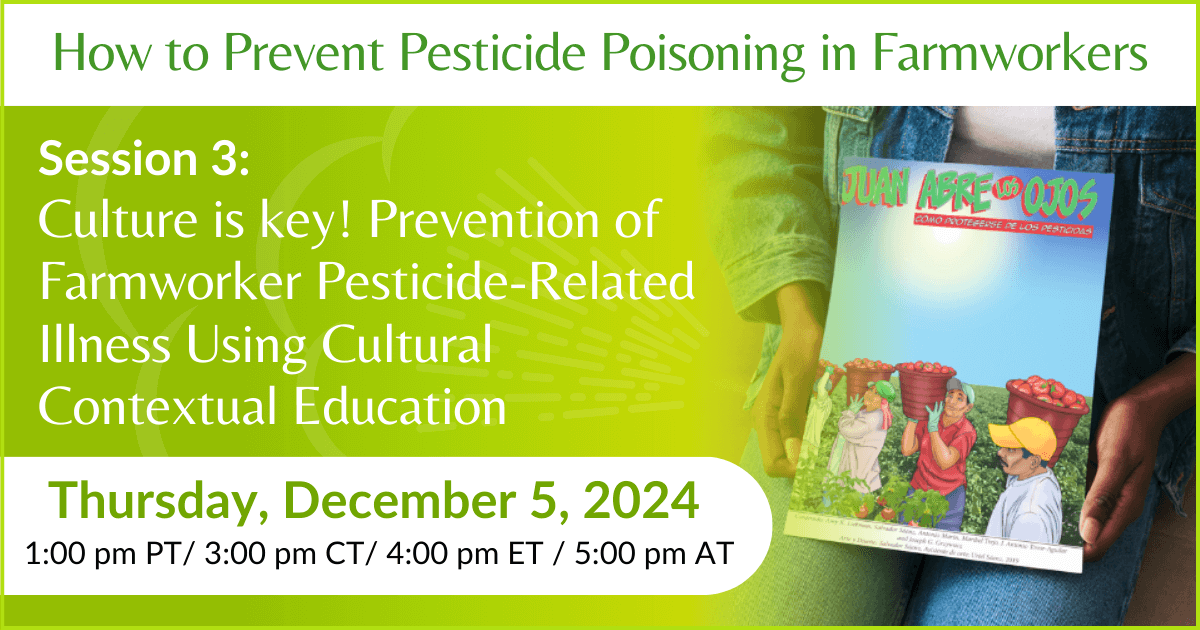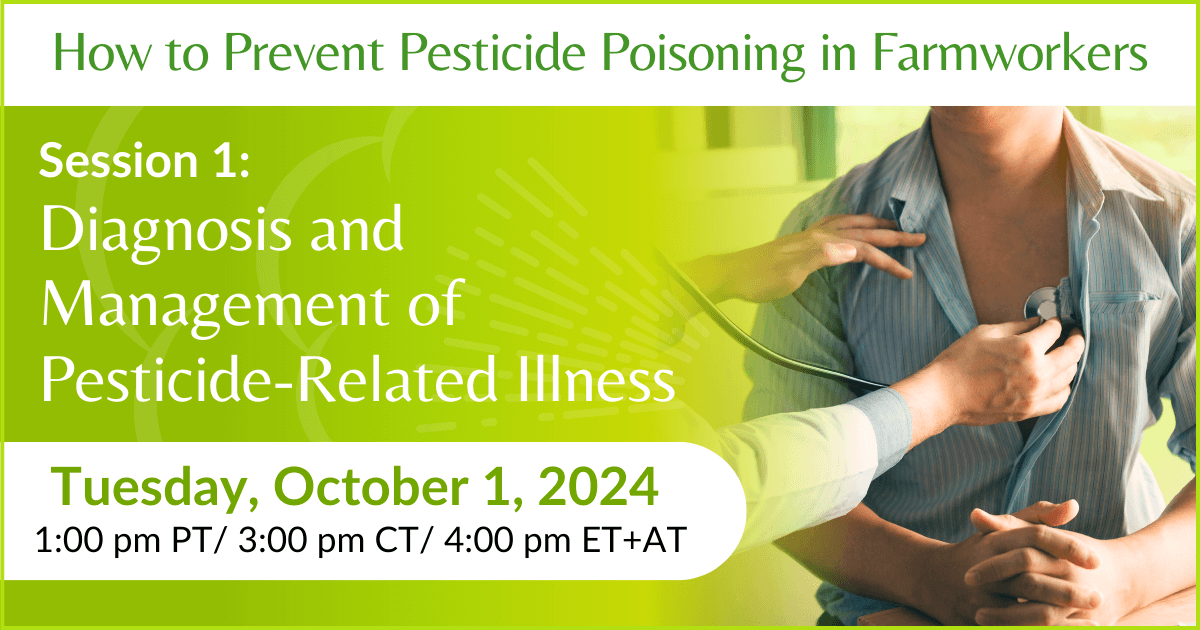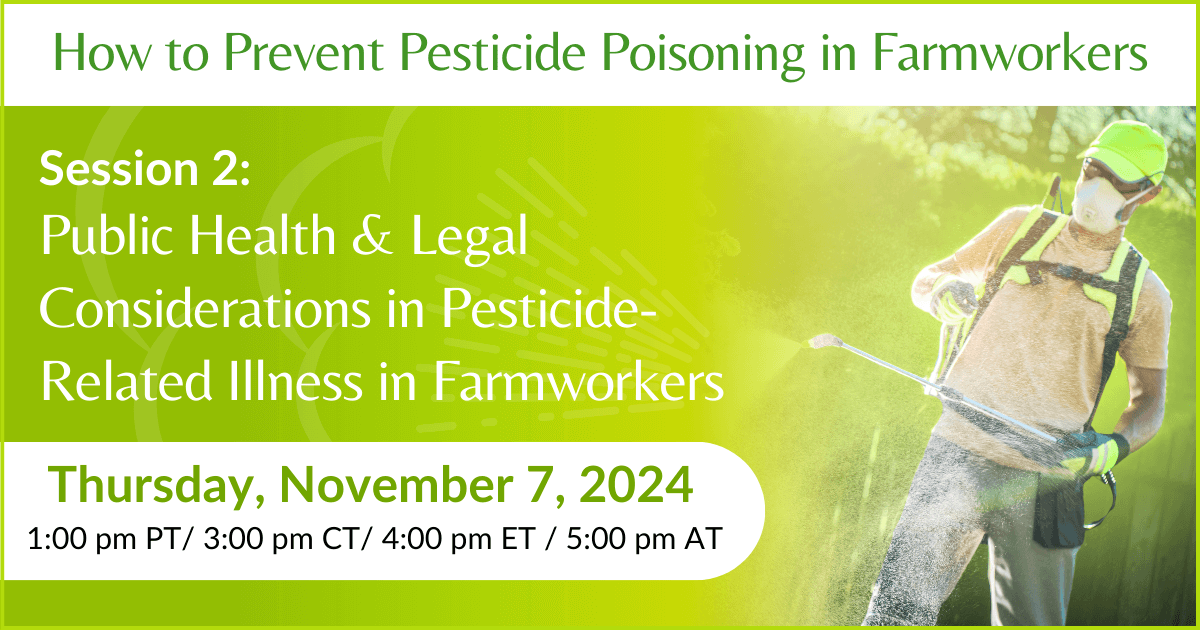
There are over 2 million farmworkers in the United States. The overwhelming majority are immigrants and face barriers including fear of job loss, lack of access to healthcare, sick pay, transportation and adequate housing. This webinar will present challenges and barriers farmworkers face in preventing pesticide poisoning. It reviews culturally contextual strategies and educational materials to prevent pesticide-related illnesses among farmworkers and their families. Resources for community health workers and farmworkers will be reviewed.
Three Webinar Series
Session 1: Diagnosis and Management of Pesticide-Related Illness
Session 2: Public Health & Legal Considerations in Pesticide-Related Illness in Farmworkers
Watch the Webinar Recording
Download the Presentation Slides
Take the Evaluation
At the conclusion of this series, participants will be able to…
- Recognize and manage/triage acute and sub-acute pesticide poisoning in farmworkers;
- Act on legal requirements and best public health practices related to pesticide exposure;
- Discuss prevention of pesticide exposure at work and at home with farmworkers.
Presenters

Amy
Liebman
MPA, MA
Chief Program Officer
Migrant Clinicians Network
Amy K. Liebman, MPA, MA has devoted her career to improving the safety and health of disenfranchised populations. She joined Migrant Clinicians Network (MCN) in 1999 and currently serves as the Chief Program Officer. With MCN she has established nationally recognized initiatives to improve the health and safety of workers and their families, including foreign-born workers. She oversees programs ranging from integrating occupational and environmental medicine into primary care to designing worker safety interventions. She is a national leader in addressing worker safety through the community health worker (CHW) model. She has been a strong advocate for worker health and safety during the COVID-19 pandemic, leading programs to improve access to care and education for migrants and immigrants. Prior to her current position, she directed numerous environmental health projects along the US-Mexico Border including an award-winning, community-based hygiene education program that reached thousands of families living without water and sewerage services. She has spearheaded policy efforts within the American Public Health Association to support the protection of agricultural workers and served on the federal advisory committee to the EPA Office of Pesticide Programs. Her programs have won several awards including the 2008 EPA Children’s Environmental Health Champion Award and the 2015 National Safety Council Research Collaboration Award. In 2011, Liebman received the Lorin Kerr Award, an APHA/Occupational Health and Safety Section honor recognizing public health professionals for their dedication and sustained efforts to improve the lives of workers. In 2024, she was honored with the Shelley Davis Humanitarian Award for her commitment to improving farmworker health and safety. She is a past Chair of APHA’s Occupational Health and Safety. Liebman has been the principal investigator and project manager of numerous government and privately sponsored projects. She has authored articles, bilingual training manuals and other educational materials dealing with environmental and occupational health and migrants. Liebman has a master’s degree from the LBJ School of Public Affairs at the University of Texas at Austin, and a Master of Arts from the Institute of Latin American Studies at the University of Texas at Austin.

Alma
Galván
MHC
Director of Training and Community Engagement
Migrant Clinicians Network
Alma Galván, MHC, is MCN's Director of Training and Community Engagement. Galván has worked for over three decades to improve the health of agricultural workers. She has extensive experience providing technical assistance and developing curricula and educational materials for adults with limited English proficiency and limited literacy, community health workers, health professionals, health educators, and clinicians. Galván has worked extensively with MCN partners, community-based organizations, health agencies, and local and state health departments.

Maggie Acosta, MA is a public health researcher with experience in both rural and urban areas in the United States, India, and Peru. She uses a multi-scalar, mixed methods approach to better understand structural determinants of health and help strengthen health infrastructure. Her vision for health research is to not only study inequities and power, but to leverage the research process itself to enhance community capacity and build power as a central component in achieving health equity. Most recently, she worked in adolescent sexual health with the Centers for Disease Control and Prevention and in reducing recidivism at the Cook County Department of Corrections. While in Chicago, she has also worked closely with the Chicago Recovery Alliance, a grassroots harm-reduction agency, to reduce drug-related health inequities and build power among people who use drugs. She holds a BA in Neuroscience from Bowdoin College and an MA in Social Sciences with a focus in Medical Anthropology from the University of Chicago.
Continuing Education Credit (CEU)

Application for CME credit has been filed with the American Academy of Family Physicians. Determination of credit is pending.

Migrant Clinicians Network is accredited as a provider of nursing continuing professional development by the American Nurses Credentialing Center's Commission on Accreditation.


